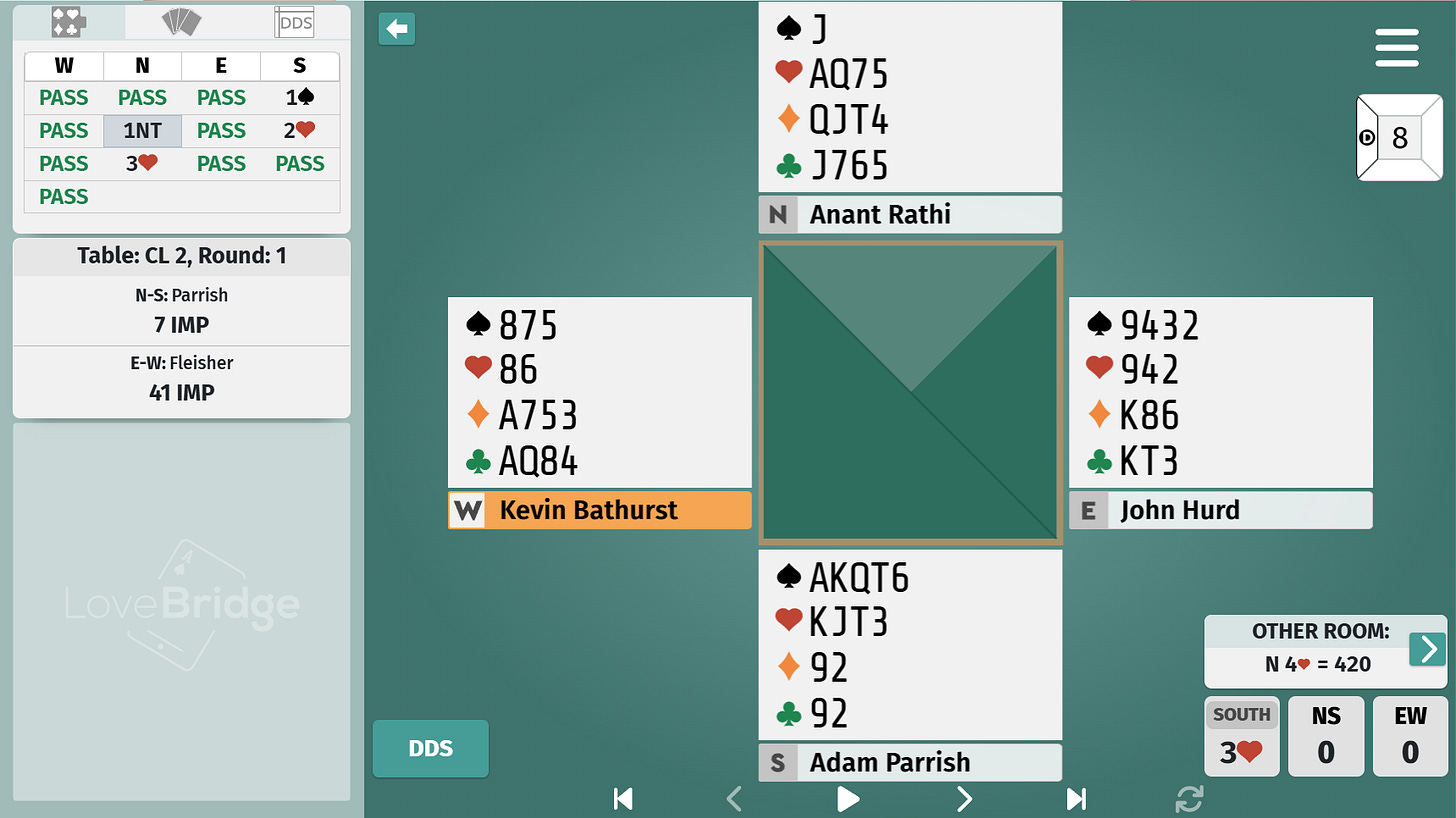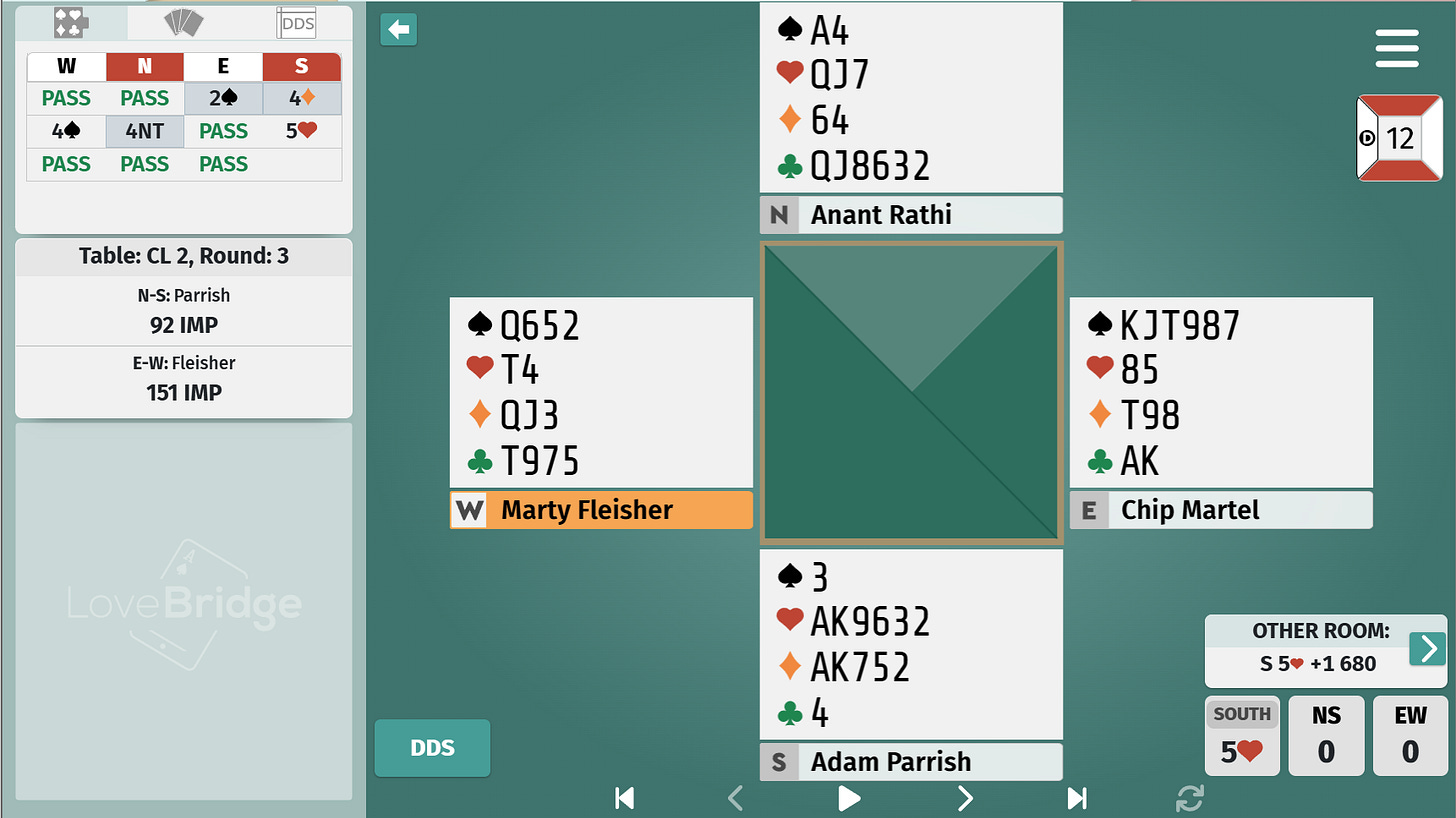I got a great suggestion from one of my readers, Donna Bianco: make reading a morning priority. I usually make a pot of tea first thing in the morning and then sit down at the computer and work. She suggested that if reading is going to be a priority, I should do it first. I tried it out and really liked it! So now I’m trying to make that a habit.
I started analyzing the Trials in earnest this week. It’s a very slow process. I look at what happened at my table, in particular my decisions. Then what happened at the other table. And on the interesting hands—which is most of them!—I look at what happened at the 14 other tables. Each 15-board segment takes a while. But it’s definitely worth it. What great feedback to see where you’re in line with your fellow experts and where you stepped out.
Here’s one where we were an outlier: we were the only pair in the event not to bid game.
I thought our actions were very reasonable. And in fact they were correct—4♥ has 4 quick losers in the minors. And they actually took them against us, when Kevin underled the ♦ A. At most tables, declarer was able to score up 10 tricks. That was easy on the common trump lead. But even at the tables where West led a diamond, most pairs didn’t get their 4 tricks.
Most of the tables duplicated our first two rounds, but almost everyone raised to game with Anant’s hand. Which surprised me. Maybe it’s my matchpoint mind. Obviously the hearts are nice, and the jack of spades could be a really great card (as it is). But the minor-suit cards could be useless (as they are).
Talking to some of the players who sat North, they all said something along the same lines: 3♥ is just a courtesy raise, you don’t get cute with these hands at IMPs, one of my minor suits could be useful if partner is 5431. I thought that was very interesting.
A few people did bid only 3♥ with the North hand, but their Souths bid 4. I did get sympathy from the folks I talked to. My hand is minimum in both high cards and shape. And if you assume that partner will just blast game with a hand like they have—that 3♥ is just a courtesy raise—passing becomes clear.
It’s great to use this review also as a way to firm up agreements with Greg. This is especially true in situations where we have early-round agreements but aren’t always on sure footing later in the auction.
4♦ is Leaping Michaels, showing a very good hand with at least 5-5 in diamonds and hearts. What happens next?
Anant and I have the general agreement that over 4M, 4NT is takeout (unless we have agreed a suit, then it’s RKB). In these situations, 4NT is usually 2 places to play, but it can also be the weaker way to bid 5♥—a direct 5♥ shows slam interest. That is what Anant intended here.
Does that treatment make sense here? There are really only two strains in play—hearts and diamonds. Is 4NT most useful as “you pick?” Or should we use both 4NT and 5♣ as flag-type bids, showing a good raise in one of my suits? And if so, which means which?
I gave the problem to Greg, and his instinct was the same as mine. Always nice when that happens; unfortunately it’s not always the case.
He said, “Establishing strain is the top priority.” And by our general agreements, we would flag in order of playability, so 4NT would be good with diamonds and 5♣ good with hearts.
One of the differences between established partnerships and everyone else is they don’t just know what conventions they play, they know what everything means afterward.
In my talk with Norman Beck, he said Eddie Kantar’s book How to Count a Bridge Hand is the best he’s ever read. Well, I had to check that out! I’m a few chapters in, and it’s very good. It’s based on a series of lessons Eddie did with the Granovetters’ Bridge Today University. They put the lessons together as a book after Eddie passed away. So far, it’s aimed at more of an intermediate level. I’ll see how it progresses and keep you posted.
I also started reading Peak: Secrets from the New Science of Expertise by Anders Ericson, who is the researcher who developed the concept of Deliberate Practice and is cited in several of the books that started my interest in expert performance. I find his arguments very convincing. Interesting that David Weiss was skeptical in our conversation.
Greg and I are back in the habit of practice. We’ve been doing Cuebids every day and did some practice one morning. We played a practice match on Sunday against our friends Peggy and Spencer. Feels good to get back into it. The Summer NABC is just around the corner!
I encourage you to share your progress in the comments. We’re all in this together!!
Have a great week.






I like Bergen's evaluation system: if the is a fit, add 5 for a void, 2- for singleton and 1 for doubleton.
In first board each hand gets 2 more points= game bid
Board 8. I can see how this applies to your leveling up process. Your bidding looks sound to me. Do you think you would do differently next time?
This next question is topical for my club. Doesn't west risk being labeled a cheat (by EDGAR) underleading the ace like he did against you?